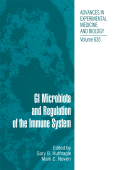
This book opens with two general reference chapters, which provide an overview of current knowledge of gastrointestinal immunology and the commensal microbiology of the gut. Next are two chapters dedicated to current methodologies used to investigate the microbiota and host: molecular analysis of microbial diversity and gnotobiotic research. Both positive and negative interactions between the microbiota and the immune system can take place in the gut, with chapters dedicated to probiotics and intestinal diseases associated with unhealthy microbiota. Environmental factors play an enormous role in shaping the microbiota composition. Host, microbial, and dietary factors take part in a complex interplay, which provides many distinct and diverse research subjects. A chapterdiscusses diet, functional foods, and prebiotics, which are dietary supplements used to specifically enhance the growth of beneficial members of the microbiota. INDICE: From the contents Section I. Overview Chapters. 1. Overview of GutImmunology. 2. The Commensal Microbiology of the Gastrointestinal Tract.- Section II. Current Techniques. 3. Overview of the Gastrointestinal Microbiota. 4. Effects of Microbiota on Gi Health: Gnotobiotic Research.- Section III. Interaction with the Host. 5. Positive interactions with the microbiota: Probiotics. 6. Negative Interactions with the Microbiota: IBD.- Section IV. Role of theDiet. 7. Diet, Immunity and Functional Foods.- Section V. Host-Microbe Signaling. 8. Host-Microbe Communication within the GI Tract. 9. Host-Microbe Symbiosis: The Squid-Vibrio Association—A Naturally Occurring, Experimental Model ofAnimal/Bacterial Par tnerships.- Section VI. Hypotheses. 10. The “Microflora Hypothesis” of Allergic Disease. 11. The Damage-Response Framework of Microbial Pathogenesis and Infectious Diseases.- Index.
- ISBN: 978-0-387-79989-6
- Editorial: Springer
- Encuadernacion: Cartoné
- Páginas: 170
- Fecha Publicación: 01/09/2008
- Nº Volúmenes: 1
- Idioma: Inglés
